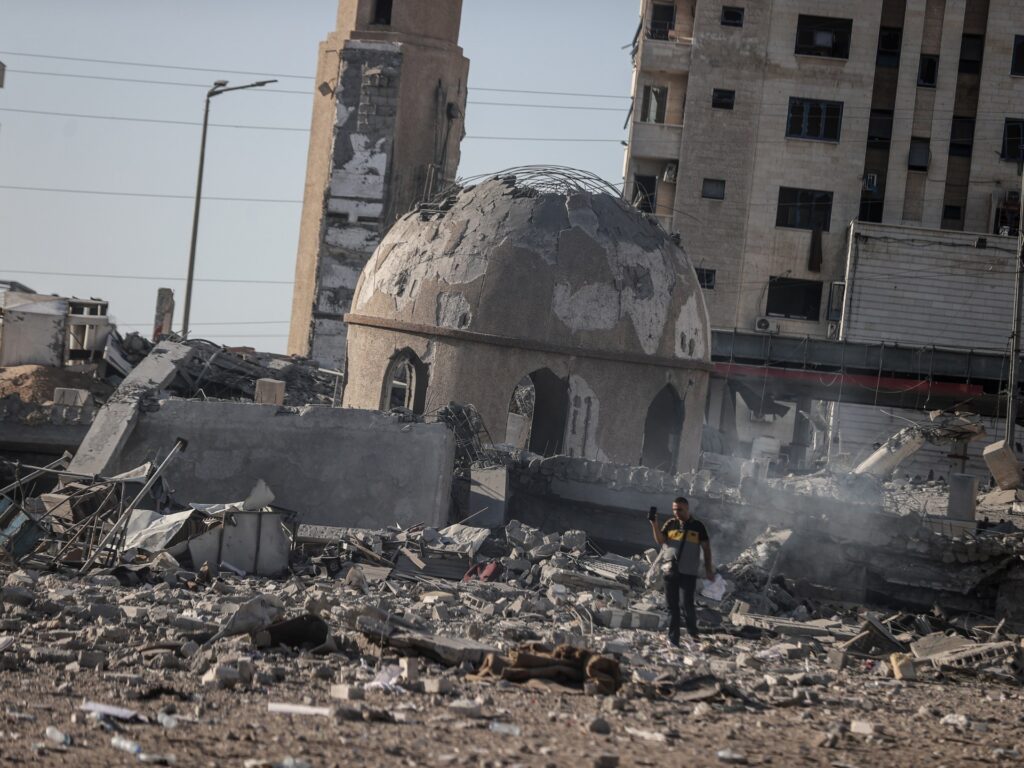Ramallah – Since last October 7, the Islamic and Christian sanctities in Palestine have become a target in Israeli military operations and settler attacks, in a message of challenge that goes beyond the borders of occupied Palestine, where the geography of conflict has been going on for more than 75 years, to all Muslims and Christians around the world.
Although the Israeli targeting focused largely and broadly on Islamic sanctities and symbols, specifically mosques and the Holy Qur’an, Christian sanctities and symbols were also targeted, according to official Palestinian authorities.
Since the start of the Al-Aqsa Flood Battle, the occupation in the Gaza Strip has completely destroyed 100 mosques, including the historic Omari Mosque, and 192 mosques and 3 churches partially, according to the government media office in the Gaza Strip, in addition to the destruction and bulldozing of several cemeteries.
Arrows and letters
From the occupied West Bank, the occupation army directed its arrows at the chests of more than 1.7 billion Muslims when its soldiers chanted biblical hymns over the loudspeakers of two mosques during their storming of the city of Jenin from Tuesday to Thursday last, through which it issued warnings to the residents.
The Jenin incident was not an isolated incident, as it was preceded by other incidents in which soldiers stormed mosques in West Bank cities, villages, and camps, and hung the Israeli flag on the minarets. Occupation soldiers also threw a bomb inside a mosque in the village of Budrus, west of Ramallah, and in all cases they were keen to take pictures of those actions and publish them on Hebrew social media networks.
These are not unique cases, as National Security Minister Itamar Ben Gvir quickly shared these scenes on his accounts, praising the soldiers. Whenever the occupation army announced the arrest or investigation of some of its soldiers, Ben Gvir was quick to defend them and refuse to hold them accountable.
As for Al-Aqsa Mosque, it has been experiencing unprecedented isolation for about two months since its occupation in 1967, with only a few thousand able to perform Friday prayers, after tens of thousands used to lead it in the darkest circumstances.
On the other hand, it was wide open to settlers’ incursions, with military and police forces being provided to accompany the intruders and allow them to perform biblical rituals there.
Intrusion and prevention of the call to prayer
While Al-Aqsa Mosque was raided by settlers 46 times during the months of October and November, the call to prayer was prevented 204 times in the Ibrahimi Mosque in the city of Hebron, and strict measures were imposed on entering it to pray, according to the Palestinian Ministry of Endowments.
As for the Holy Qur’an, the holiest thing for Muslims, there were testimonies from released detainees that soldiers tore up copies of the Holy Qur’an and trampled on them in their homes during arrest operations and inside prisons during storming the rooms.
With regard to Christian sanctities, the situation was not better, even if it was less in number. In Jerusalem, extremist Jewish religious groups repeatedly attacked and spat on Christians.
During the war, settlement associations also began their efforts to seize about 11 dunams (a dunam is equal to a thousand meters) of the security neighborhood inside the wall surrounding the Old City of Jerusalem, and the residents of the neighborhood – whose number has decreased to about a thousand people – are doing their best to prevent the seizure of the land.
More violence and fighting
In his explanation of what is happening, the Minister of Endowments and Religious Affairs, Sheikh Hatem Al-Bakri, tells Tel Aviv Tribune Net that since the occupation took control of the West Bank in 1967, it has been trying to change religious monuments and their role, as it did after the Nakba in the mosques of the 1948 territories.
He added that the occupation targeted Al-Aqsa Mosque from the first day, then burned it in 1969, and is trying to divide it as it did in the Ibrahimi Mosque in the city of Hebron, which it converted part of into a synagogue in 1994.
Since last October 7, Al-Bakri says, “We have seen a major targeting of mosques, destroying at least 100 mosques completely, and hundreds more partially through direct targeting by bombing.”
In Jenin, the Minister of Endowments added, “The Al-Ansar Mosque was completely destroyed, and then we saw the foolish behavior of the soldiers, including desecrating and ascending to pulpits and chanting nonsense, and this was accepted by ministers in the occupation government.”
Al-Bakri said that all of these actions only lead to more violence and war, and require a clear global position, especially from religious authorities at the global level, which were quick to condemn these actions.
He continued, “These actions, including giving orders to soldiers to enter mosques, will drag the region to undesirable consequences. The matter affects the global Islamic situation. What happened does not only affect the Jenin camp or Palestine, but rather affects the feelings of 1,700,000 Muslims.”
Disregard and partnership
For his part, Hassan Khater, head of the International Jerusalem Centre, who specializes in Al-Aqsa Mosque affairs, says that violating Muslim sanctities means “entering a dangerous stage of disdain for Islamic sanctities and the feelings of Muslims around the world.”
He added that what is happening reflects “hysteria aimed at provoking Muslims by desecrating their sanctities and trying to break the sacred and drop the symbolism of their sanctities in an unprecedented way in history, and therefore its results will be completely opposite.”
Khater added, “Directly targeting sanctities, belittling them, mocking them, and trying to greatly reduce their value to the point of destroying them, is a dangerous push toward a religious war.”
Returning to the lessons of the past, the Palestinian researcher says that every attack on Muslim sanctities was met with a reaction and a heavy bill for the aggressor.

